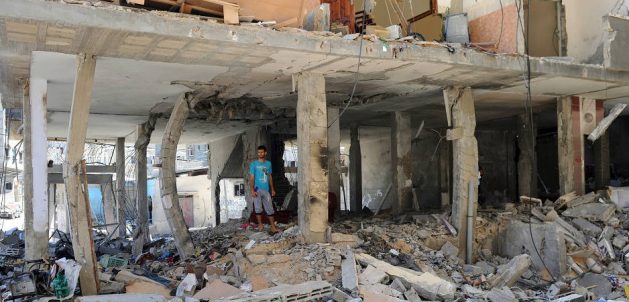UNITED NATIONS, Aug 24 (IPS) – The latest Israeli evacuation order on August 17 led to the displacement of over 13,000 individuals, Secretary-General Stéphane Dujarric told a press conference at the UN headquarters.
The briefing held on October 19, 2024 detailed the impact of the continuation of the hostilities since the Hamas attack on Israel on October 7, 2023.
The evacuation order was the latest in a series by the Israeli government that have exacerbated the ongoing humanitarian crisis in Gaza. The conditions in the region are dire, with Palestinians facing a lack of access to food, clean water, fuel, and healthcare, as well as constant bombings, outbreaks of diseases, and displacement.
The number of Palestinians that have been killed during the course of the Israel-Hamas War this past year greatly exceeds that of any point during the entire Israeli-Palestinian conflict. While it is difficult to pinpoint the exact number of lives lost in the Gaza Strip, it has been confirmed to exceed 40,000.
During a press briefing at the UN Headquarters on August 14, 2024, the Secretary-General’s deputy spokesperson, Farhan Haq, said, “Ongoing bombardment and hostilities in Gaza continue to kill, injure and displace Palestinians, as well as damage and destroy the homes and infrastructure they rely on… In the West Bank, including East Jerusalem, Israeli settlers and forces killed five Palestinians between August 6 and August 12. Another 54 Palestinians, including 11 children, were also injured during the same period.”
In addition to the deaths and displacements, Palestinians have been forced to relocate to refugee camps and reside in the remnants of children’s schools and hospitals, which were bombarded and are now nearly inhospitable.
Earlier in the month, the Secretary General’s spokesperson, Stéphane Dujarric, said, “The ongoing hostilities, constant evacuation orders, and severe shortages of essential supplies are making it increasingly difficult for displaced families to access basic services at their place of arrival.”
Dujarric added that severe fuel shortages interfere with the operations of healthcare facilities, as ambulances and essential surgeries are often halted or postponed. This is particularly concerning as Palestinians need widespread access to healthcare, with many of them suffering from disease, malnutrition, and life-threatening injuries as a result of constant Israeli blockade, bombardment, and relocation.
There was also concern that humanitarian aid was being denied.
According to Haq, Israeli authorities have rejected about a third of aid missions to Gaza since August 1. The cumulative impact of these access constraints is to perpetuate a continued cycle of deprivation and distress among affected people who are facing death, pain, hunger, and thirst on a daily basis.”
This built on an earlier statement from Dujarric that while 500 aid trucks were sent to the Gaza Strip every day, a daily average of 159 trucks were allowed in unimpeded.
Israel denies blocking humanitarian aid.
The International Court of Justice earlier this year ordered that Israel halt its military offensive in the Rafah governorate. This followed an earlier order that Israel should take all measures to prevent any acts contrary to the 1948 Genocide Convention. South Africa brought a case arguing that Israel’s actions in the Gaza Strip during the Israel-Hamas war led to a humanitarian crisis and mass killings, potentially amounting to genocide.
IPS UN Bureau Report
© Inter Press Service (2024) — All Rights ReservedOriginal source: Inter Press Service




